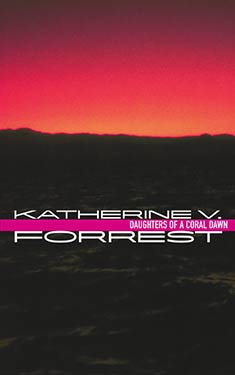Katherine V.
Forrest
Completed 6/19/2019,
Reviewed 6/19/2019
4 stars
I thought
this book was an excellent excursion into old-school lesbian feminist science
fiction. First published in 1984, it
imagines a world where a group of women have escaped an oppressive sexist
government and created their own utopia on a distant planet. Then some men from their old world show up
and they somehow have to deal with them.
It is really well written and well thought out. Unfortunately, it is dated in that today, we
are all about inclusivity, as opposed to separatism. However, I think it is an important novel
from an historical perspective, and as we see today how women’s right are
slowly eroding, it still has some meaning for us.
 The book
begins with an Earth man marrying an alien woman. Although this union is illegal, the alien
looks so much like an Earth human that she can pass as such. They have nine daughters, all at once. All the daughters are brilliant in some
way. As they mature and marry, they have
more brilliant daughters. They also live
much longer than humans, so soon there are six thousand descendants. The world they live in is very patriarchal
and sexist, though these women have made their way to the tops of their
fields. At one point, “Mother” calls an
enclave of all her descendants. Called
the “Unity”, they decide it is time to leave their repressive life on Earth and
create a new homeland on another planet.
All is peaceful on “Maternas” until a damaged ship from Earth arrives
and threatens their very existence.
The book
begins with an Earth man marrying an alien woman. Although this union is illegal, the alien
looks so much like an Earth human that she can pass as such. They have nine daughters, all at once. All the daughters are brilliant in some
way. As they mature and marry, they have
more brilliant daughters. They also live
much longer than humans, so soon there are six thousand descendants. The world they live in is very patriarchal
and sexist, though these women have made their way to the tops of their
fields. At one point, “Mother” calls an
enclave of all her descendants. Called
the “Unity”, they decide it is time to leave their repressive life on Earth and
create a new homeland on another planet.
All is peaceful on “Maternas” until a damaged ship from Earth arrives
and threatens their very existence.
The story is
told from the point of view of several women, the primary two being Minerva,
the historian of the Unity, and Megan, the chosen leader of the group. Both are in journal form. Their journal entries go back and forth to
create the narrative. Minerva is one of
the elders of the group, one of the original nine daughters. Her chapters give the history of the family
and recounts the settling of Maternas. Megan’s
fills in the blanks, and give an insight into what it’s like to be a leader and
a pledged celibate. Minerva is quite likeable
as the main voice of the story. Megan’s
character is a little dry at times, as she eschews emotional reactions and
maintains a professional air. But I
began to like her character more as she became vulnerable when one of the women
on the planet flirts with her. You get
to see some of her shell beginning to crack.
I also
really liked Mother. She added humor to everyone’s
seriousness. She had an insightful head on
her shoulders and called them as she saw them.
She’s also the only heterosexual on the planet. All the other women begin to form
relationships.
The one
thing I seemed to have missed was how the lesbian couples were having
children. But they do continue to have
progeny, all daughters, and soon the population of the planet goes from four to
ten thousand. (Only four thousand of the
original six thousand actually leave Earth.
The rest stay on Earth and are the subject of the second in this
series).
I read quite
a few reviews of this book and there are a lot of people who disliked it because
of the separatist and men-hating attitude.
While I found it a little archaic, I didn’t find it much different from other
books of this period, the most popular one being “The Handmaid’s Tale. Being a man, I wasn’t put off or threatened
by the book’s themes. Rather, I felt it
was an educational experience, getting a feeling for the separatist attitudes which
came before our much healthier and contemporary energies of inclusivity and the
fight against toxic masculinity.
I give the
book four stars out of five. It was very
nearly a five-star book, as the prose was beautiful without being overbearing,
and the story, though not really original (there have been other lesbian science
fiction utopia books before this one), kept my interest keenly. But the emotional impact of the book was not
as profound as I’ve usually experienced for a five-star review. However, I look forward to the rest of the
series and hope to get them all read successively.
No comments:
Post a Comment